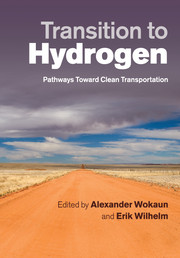Book contents
- Frontmatter
- Contents
- Contributors
- Foreword: on the transition to hydrogen
- Preface
- Executive summary
- Abbreviations
- 1 Introduction
- 2 Life cycle assessment of hydrogen production
- 3 Technical characterisation and multi-criteria analysis of light-duty vehicles
- 4 Hydrogen emissions to the atmosphere from industry and transportation
- 5 Regional fleet simulation
- 6 Long-term scenarios of the global energy and transport system
- 7 Integrated assessment of hydrogen in transportation
- Appendix A Summary of fundamental assumptions
- Appendix B Selected input assumptions, technology descriptions, and heuristics
- Appendix C Characteristics of the present and future vehicle designs
- Appendix D Survey questionnaire and aggregated responses
- Appendix E Assumptions and inputs driving fleet dynamics simulation
- References
- Index
- Plates
7 - Integrated assessment of hydrogen in transportation
Published online by Cambridge University Press: 05 November 2011
- Frontmatter
- Contents
- Contributors
- Foreword: on the transition to hydrogen
- Preface
- Executive summary
- Abbreviations
- 1 Introduction
- 2 Life cycle assessment of hydrogen production
- 3 Technical characterisation and multi-criteria analysis of light-duty vehicles
- 4 Hydrogen emissions to the atmosphere from industry and transportation
- 5 Regional fleet simulation
- 6 Long-term scenarios of the global energy and transport system
- 7 Integrated assessment of hydrogen in transportation
- Appendix A Summary of fundamental assumptions
- Appendix B Selected input assumptions, technology descriptions, and heuristics
- Appendix C Characteristics of the present and future vehicle designs
- Appendix D Survey questionnaire and aggregated responses
- Appendix E Assumptions and inputs driving fleet dynamics simulation
- References
- Index
- Plates
Summary
The analyses presented in this book have resulted in several overarching conclusions, which may be briefly summarised as follows:
Increasing transportation energy security and reducing the environmental impacts of personal vehicles are important high-level goals.
To achieve these goals, there is no single solution or ‘silver bullet’ pathway.
Hydrogen will only represent an attractive transportation fuel to meet stringent CO2 reduction targets if it is produced from primary energy resources with zero or low CO2 emissions in the future energy system.
The paradigm shift that is needed to make the transition from the current, problematic global transportation system will be led by the example of visionary communities, groups, and countries, using innovations that will necessarily be created by the developed world.
Both short- and long-term policy measures are needed to support the development of future mobility technology, in order to internalise costs and provide a pathway to clean transportation.
In addition, the following themes are central to the role that hydrogen can play as a transportation fuel and have been explored throughout this book:
The life cycle impacts of the full hydrogen fuel cycle were compared with conventional fuels.
Changes in the hydrogen emissions due to transport were analysed, along with their effects on atmospheric chemistry.
The ‘optimum’ design of a vehicle for any single buyer depends strongly on both the desired mix of performance and utility and on the available fuels. A multi-criteria methodology for an individualised assessment of vehicle design options has been developed.
Introducing hydrogen will require profound changes in the transportation system. The dynamics of the way innovations diffuse into transportation markets was therefore studied, considering barriers, opportunities, and feedbacks.
Energy–economic models have been used to generate scenarios maximising inter-generational welfare. Resource scarcity and climate protection goals were identified as important drivers promoting changes in the transportation system.
- Type
- Chapter
- Information
- Transition to HydrogenPathways Toward Clean Transportation, pp. 212 - 222Publisher: Cambridge University PressPrint publication year: 2011



